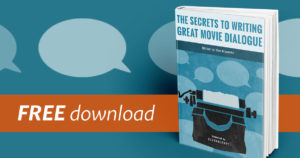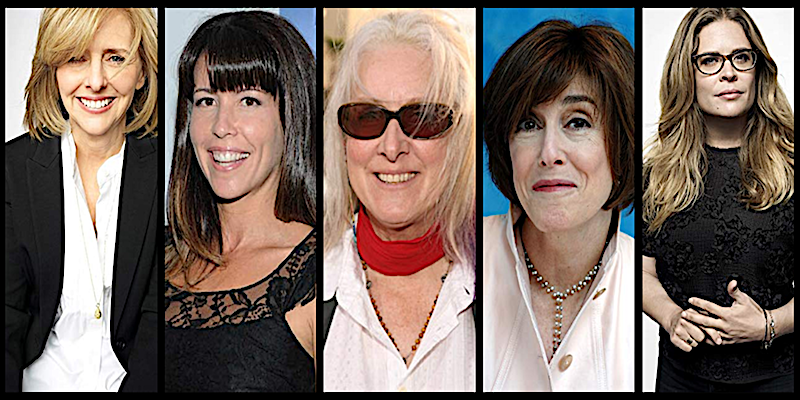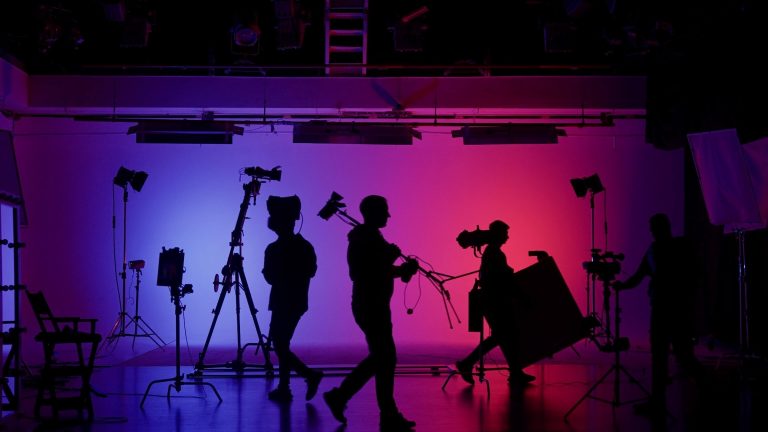15 Inspiring Quotes from the Five Highest-Grossing Female Directors
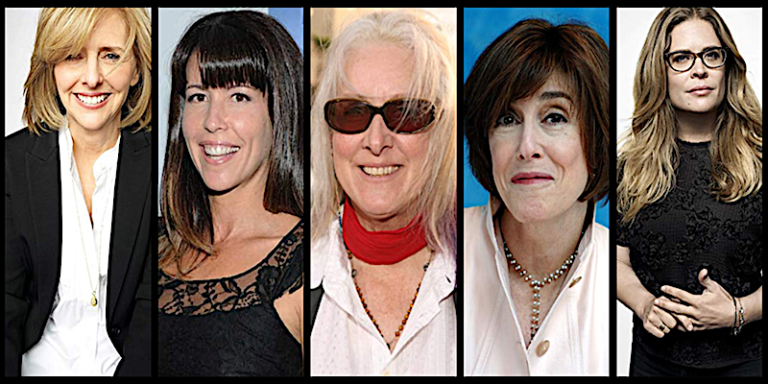
Who are the highest-grossing female directors, and what wise and inspiring lessons can screenwriters and filmmakers learn from them?
It goes without saying that women are undervalued, underappreciated, and underutilized within the film industry — especially on the studio level.
When they are given a chance, they shine, proving that it doesn't matter what gender a director is — it's talent that always prevails.
Here we celebrate the five highest-grossing female directors as of the beginning of 2020 by featuring wise and inspiring quotes that screenwriters and filmmakers can learn from, accompanied by our own brief elaboration on their words.
Note: The box office numbers are not adjusted for inflation and represent figures through January 14th, 2020.
1. Jennifer Lee
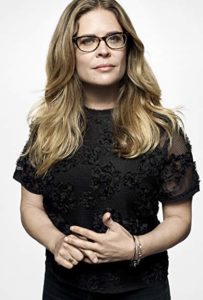
Domestic: $860,271,201
Worldwide: $2,641,700,078
The Walt Disney Animation Studios executive and animation screenwriter and director was behind the camera for Frozen and Frozen II.
“Don’t lose faith in what you are trying to do, even though you will get pummeled emotionally left and right. There are a lot of NOs to any YES. And that’s OK.”
You have to fail before you can prevail. Every single successful screenwriter has failed more than they've ever succeeded. And the same can be said for filmmakers as well.
"If I learned one thing, it is that self-doubt is one of the most destructive forces. It makes you defensive instead of open, reactive instead of active. Self-doubt is consuming and cruel. And my hope today is that we can all collectively agree to ban it... Think to the moments of your life when you forgot to doubt yourself, when you were so inspired that you were just living and creating and working. Pay attention to those moments because they're trying to reach you through those lenses of doubt and trying to show you your potential."
There's no time or reason to doubt yourself. When you fall into that trap, you're giving in to your insecurities and allowing fear to drive your decisions. Let those doubts about your capabilities go. Know that failure is part of the process — and take comfort in knowing that most of the best choices as a writer or filmmaker come when you learn from your failures, missteps, or hindrances.
"If you wanna do a film where you have a big scope, you've got to make your characters relatable and genuine."
Writing high-concept movies is fine — audiences love that type of cinematic experience. But if you really want to keep the story interesting amidst those big ideas, place characters within those concepts that have depth and empathy that the audience can relate with. Give them an edge. Make them flawed. That's how you leave the audience with that cathartic experience they desire.
Great movies shine with great dialogue. Get help and insights when you download this free eBook!
2. Nancy Meyers
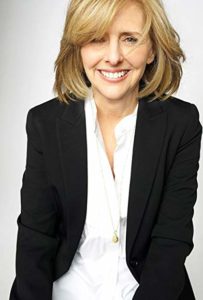
Domestic: $625, 578, 930
Worldwide: $1,351,688,561
The celebrated screenwriter and director directed the likes of The Parent Trap, What Women Want, Something's Gotta Give, The Holiday, It's Complicated, and The Intern.
"I have a huge collection of music that I listen to when I’m writing, and I also prepare a lot of music before I start directing. I put it all onto an iPod that I have with me on the set. It’s helpful to the actors because, for an emotional scene, I’ll play it and say, this is how it feels, to keep us in the zone."
Listening to music as you write can be a key to jump-starting your writing process, helping you to inject emotion, tone, and atmosphere into each and every scene and moment in your screenplay. And as a director, it helps to use it as an easy way to communicate the emotion, tone, and atmosphere that you want throughout your film and for particular moments throughout.
Music is a vital component of cinema. It can guide audiences into the intended emotion for each and every moment within a film. It can accentuate the emotions being felt by characters and the moments created within a story. It can give a sense of tone, pacing, and atmosphere. And when you write to music — or direct with specific music in mind as a temp track — those intended emotions and other cinematic elements that you attribute to certain tracks transfer onto the page and the screen.
"How do you [edit]? You just start tearing away at it... It’s impossible to see what it is at first. You just keep taking away and taking away, and it begins to shape up. Story, you know — you just keep following the story."
There's no secret formula for rewriting and editing your scripts. It's relatively simple — you trim everything away until the core of the concept, story, and characterizations appear — then you follow those leads.
"I think it’s a mistake to write something you think people will like, or a combination idea, or this year’s version of last year’s movie. I don’t think you’ll ever get noticed doing that. I think you’re only going to get noticed by following your own instincts and doing original work and writing the thing that only you can write."
Don't chase trends. It never works for unestablished screenwriters because you're always months or years behind Hollywood. Hollywood jumps on the bandwagon before anyone else. They've already hired writers to chase any trends. For undiscovered screenwriters, by the time you write the trend-chaser, market it, and get it into the hands of those that can do something with it, a couple of years have gone by — the trend is already dead.
As a newcomer, you should be writing originals and giving Hollywood what they didn't know they needed. Set your own trends.
3. Betty Thomas
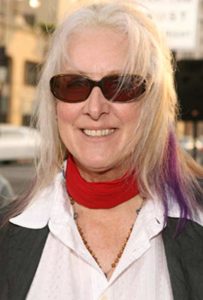
Domestic: $563,123,893
Worldwide: $1,016,552,451
She directed hits like The Brady Bunch Movie, Private Parts, Doctor Doolittle, 28 Days, I Spy, John Tucker Must Die, and Alvin and the Chipmunks: The Squeakquel.
"Chicks don’t do chick flicks. They do whatever flick interests them, whatever subjects."
Don't ever feel that you have to succumb to the pressures of staying under whatever umbrella your age, race, or gender is associated with in society or the film and television industry, according to stereotypical or dated figures and trends.
Be blind to the ignorance that many have and strive to be the one to open their eyes.
Write what you're passionate about. It's perfectly okay to write romantic comedies, action flicks, epics, dramas, or horror stories as a man or woman — at whatever age and as whatever ethnicity. It's okay to write anything you want — as long as you're passionate about it. And that passion will carry over in the work.
"You know what? A lot of people say, 'Give me the greatest script in the world.' And I don't know that I want that. I want a script where it's difficult to understand why it's funny or moving, or why a person would want to spend millions of dollars making it. Because I like the idea that a script is just a blueprint, to blow open and explore."
As a screenwriter, you need to understand that it only starts with the screenplay. Your words are going to change. Your scenes, sequences, and storylines will change once the script is handed over to the director.
It's a collaborative medium — and you need to yearn for that moment when more discoveries are made once directors, actors, location managers, set designers, and editors begin their creative journey with your screenplay.
"[Painting] is a lot like writing, I think. You have a blank page before you. Or a blank canvas before you. And you must fill it. And no one else can really help you fill or — or finish it. Or know when you're finished. Knowing when you're finished is such a weird thing. You have to know."
Writing is lonely. Yes, you can write with a partner, and that kind of collaboration has its own merits. But to truly find your instincts as a writer, you have to tackle something alone. You have to experience the vulnerability of being the one in charge of filling that blank canvas. And then you have to learn to trust yourself and your instincts.
4. Nora Ephron
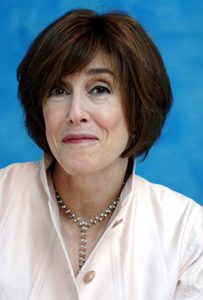
Domestic: $511,970,444
Worldwide: $877,804,290
The late, great screenwriter and director helmed This Is My Life, Sleepless in Seattle, Mixed Nuts, Michael, You've Got Mail, Lucky Numbers, Bewitched, and Julie & Julia.
“[Sleepless in Seattle] was a script that had been written by three or four other writers before me, and it never really worked, but it had this amazing ending on the top of the Empire State Building that just worked, no matter what came before it.”
Most concepts start with a single magical moment or visual that the screenwriter can’t get out of their head. That’s the seed — whether it’s the beginning, turning point, or final scene of the story. The screenplay is about building onto that magical moment or visual to create something truly special.
“Take notes. Everything is copy.”
Copy is a publishing industry term that can be equated to content or material in the film and television industry. The precise meaning of the quote is that life breeds the best material. You can draw whole stories from your life experiences and those around you. You can draw whole characters from your life as well and implant them into the context of your cinematic stories.
Be aware of everything around you. Be mindful of what’s happening in and around your life. Everything is possible future copy, content, or material.
“Reading is escape, and the opposite of escape — it’s a way to make contact with reality after a day of making things up, and it’s a way of making contact with someone else’s imagination after a day that’s all too real.”
While writing is obviously a crucial part of becoming a great writer, reading is a necessary component as well. It can allow you to escape from your own narratives for just long enough to enjoy the return back to them. It can also inspire you when you feel your yourself struggling with your own writing process.
Read books and read scripts whenever you can. It’s just as important as the actual writing.
5. Patty Jenkins
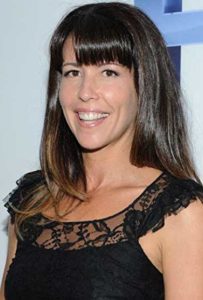
Domestic: $447,032,618
Worldwide: $885,374,191
Jenkins directed critically-acclaimed films like Monster and Wonder Woman, with Wonder Woman 1984 coming up, which will surely push her up this list.
"To embrace how truly hard it is and always will be, to be really honest with yourself about whether that’s really what you want to do with your life, and then to put one foot in front of the other relentlessly. Also to try to keep your eye on the ball about what you want out of it, and not get distracted by things you don’t care about."
This is what every screenwriter and filmmaker needs to do at the beginning of their journey. You need to make sure that you're willing to do whatever it takes — within reason — to make this dream come true. And if you're not ready to put forth the time and effort, or to face the heartache of many inevitable rejections, you need to realize that maybe this journey isn't for you — and there's nothing wrong with that.
If you deem that it is for you, then you need to expect your journey to be difficult. Embrace that difficulty because that is what hones your skills and makes you a better writer or filmmaker. After that, set your eyes on a goal and don't get off course from it.
"Longevity of focus, I think, is the hardest part... to have a vision and then try to hold that vision and not have it change."
When you're developing a screenplay or film, do your best to jump into the process without stopping. Get yourself on a schedule. Set a deadline. Too many young screenwriters and directors languish in development, mostly out of fear of tackling the beast that is their screenplay or film. You need to challenge yourself with a deadline, sharpen your skills by creating a tight schedule, and prove to yourself that you can deliver — all while remaining focused on your vision.
"Humble perseverance and the ability to observe and grow in pursuit of making what you love and believe in. Really. THAT is the secret."
Wise words.
____________________________________________________
We will be featuring many other great female screenwriters and directors — many of whom came close to being on this list (and would have with adjusted-for-inflation numbers) — in their own posts featuring their wise and inspiring words.
Until then, enjoy...
Screenwriting Advice From LADY BIRD Writer/Director Greta Gerwig
Screenwriting Wisdom from Some of Hollywood‘s Best Female Screenwriters
Screenwriting Wisdom from Today’s Women in Hollywood
35 Powerful Quotes From Women in Hollywood
Ken Miyamoto has worked in the film industry for nearly two decades, most notably as a studio liaison for Sony Studios and then as a script reader and story analyst for Sony Pictures. He has many studio meetings under his belt as a produced screenwriter, meeting with the likes of Sony, Dreamworks, Universal, Disney, Warner Brothers, as well as many production and management companies. He has had a previous development deal with Lionsgate, as well as multiple writing assignments, including the produced miniseries Blackout, starring Anne Heche, Sean Patrick Flanery, Billy Zane, James Brolin, Haylie Duff, Brian Bloom, Eric La Salle, and Bruce Boxleitner. Follow Ken on Twitter @KenMovies
For all the latest ScreenCraft news and updates, follow us on Twitter, Facebook, and Instagram.
Tags
Get Our Screenwriting Newsletter!
Get weekly writing inspiration delivered to your inbox - including industry news, popular articles, and more!

